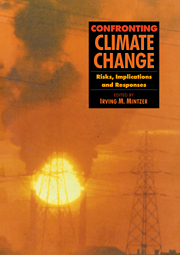Book contents
- Frontmatter
- Contents
- Foreword
- Acknowledgements
- List of Reviewers
- 1 Living in a Warming World
- I The Science of Climate Change
- II Impacts of Global Climate Change
- III Energy Use and Technology
- IV Economics and the Role of Institutions
- 15 The Economics of Near-Term Reductions in Greenhouse Gases
- 16 “Wait and See” versus “No Regrets”: Comparing the Costs of Economic Strategies
- 17 International Organisations in a Warming World: Building a Global Climate Regime
- 18 Modifying the Mandate of Existing Institutions: NGOs
- 19 Modifying the Mandate of Existing Institutions: Corporations
- 20 International Trade, Technology Transfer and Climate Change
- V Equity Considerations and Future Negotiations
- Annex I
- Annex II
- Glossary
- Index
15 - The Economics of Near-Term Reductions in Greenhouse Gases
Published online by Cambridge University Press: 06 January 2010
- Frontmatter
- Contents
- Foreword
- Acknowledgements
- List of Reviewers
- 1 Living in a Warming World
- I The Science of Climate Change
- II Impacts of Global Climate Change
- III Energy Use and Technology
- IV Economics and the Role of Institutions
- 15 The Economics of Near-Term Reductions in Greenhouse Gases
- 16 “Wait and See” versus “No Regrets”: Comparing the Costs of Economic Strategies
- 17 International Organisations in a Warming World: Building a Global Climate Regime
- 18 Modifying the Mandate of Existing Institutions: NGOs
- 19 Modifying the Mandate of Existing Institutions: Corporations
- 20 International Trade, Technology Transfer and Climate Change
- V Equity Considerations and Future Negotiations
- Annex I
- Annex II
- Glossary
- Index
Summary
Editor's Introduction
Many analysts have suggested that limiting the risks of rapid climate change by reducing the emissions of greenhouse gases will be very costly, especially in advanced industrial economies. Using simple models, such analysts argue that emissions-reducing technologies will increase the costs of production. These costs, they say, will divert investment from more productive opportunities and penalize the companies and countries that impose the most stringent environmental constraints on their domestic activities.
In this chapter, Eberhard Jochem and Olav Hohmeyer demonstrate that just the opposite is true. Economies benefit, even in the short term, from strategies that promote environmental protection through the development of new technologies. To make their point, these authors start with a difficult case: the Federal Republic of Germany, which has already achieved substantial gains in energy efficiency during the last two decades, but where opportunities for further improvement, and even greater economic benefit still exist.
Using a sophisticated macro-economic analysis, Jochem and Hohmeyer show, for the German case, that policies to improve energy efficiency and to shift the energy mix to advanced technologies and less carbon-intensive fuels will generate four important kinds of benefits for the national economy. Such policies will (1) spur overall economic growth, (2) quickly generate a large number of jobs within the country (including the sort of entrepreneurial jobs which encourage a resourceful, self-sufficient, and satisfied workforce), (3) increase exports of high technology products, and (4) reduce environmental and social costs of energy use that were previously uncounted in the market transactions for fuel. Taken together, these benefits will work to reduce the social costs paid by the society as a whole to subsidize economic development.
- Type
- Chapter
- Information
- Confronting Climate ChangeRisks, Implications and Responses, pp. 217 - 236Publisher: Cambridge University PressPrint publication year: 1992
- 4
- Cited by

